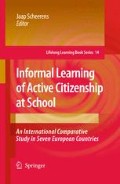The conceptual framework for this study consists of three types of factors (see Fig. 2.1):
-
1.
the citizenship competencies and values
-
2.
the informal student activities and experiences at school and
-
3.
the school context.
Access this chapter
Tax calculation will be finalised at checkout
Purchases are for personal use only
Preview
Unable to display preview. Download preview PDF.
References
Bandura, A. (2001). Social cognitive theory: An agentic perspective. Annual Review of Psychology, 52, 1–26.
Carter, C., & Osler, A. (2000). Human rights, identities, and conflict management: A study of school culture as experienced through classroom relationships. Cambridge Journal of Education, 30, 335–356.
Coombs, P. H., & Ahmed, M. (1974). Attacking rural poverty: How non-formal education can help. Baltimore: Johns Hopkins University Press.
Deakin Crick, R. (2000). Achieving a whole school approach to the spiritual, moral, social and cultural development of pupils. Bristol: EducareM.
Deakin Crick, R. (2002). Transforming visions, managing values in schools: A case study. Bristol: Middlesex University Press.
Deakin Crick, R., Coates, M., Taylor, M., & Ritchie, S. (2004). A systematic review of the impact of citizenship education on the provision of schooling. London: EPPI-Centre, Social Science Research Unit, Institute of Education. http://eppi.ioe.ac.uk/EPPIWeb/ home.aspx?page=/reel/review_groups/citizenship/review_one.htm
Eurydice. (2005). Citizenship education at school in Europe. Brussels: Eurydice.
Fagen, S. A. (1986). Least intensive interventions for classroom behavior problems. Pointer, 31, 21–28.
Flecknoe M (2000) Can continuing development for teachers be shown to raise pupils’ achievement? Journal of In Service Education, 26, 437–458.
Flecknoe, M. (2002). Democracy, citizenship and school improvement: What can one school tell us? School Leadership and Management, 22, 421–437.
Fraser, B. J. (1987). The study of learning environments. Perth: Curtin University of Technology.
Gilligan, C. (1986). Remapping the moral domain: New images of the self in relationship. In Th. C. Heller, M. Sosna & D. E. Wellbery (Eds.), Reconstructing individualism: Autonomy, Individuality, and the self in Western thought(pp. 237–252). Stanford, CA: Stanford University Press.
Habermas, J. (1990). Moral consciousness and communicative action. Cambridge: Polity Press.
Halstead, J. M., & Taylor, M. J. (2000). The development of values, attitudes and personal qualities: A review of recent research. Slough: National Foundation for Educational Research (NFER).
Holden, G. (1991). The relationship of self-efficacy appraisals to subsequent health related outcomes: A meta-analysis. Social Work in Health Care, 16, 53–93.
Johnson, J. (1991). Habermas on strategic and communicative action. Political Theory, 19(2), 181–201.
Kerr, D., Lopes, J., Nelson, J., White, K., Cleaver, E., & Benton, T. (2007). Vision versus Pragmatism: Citizenship in the secondary school curriculum in England. Slough: National Foundation for Educational research.
La Belle, Th. J. (1982). Formal, nonformal and informal education: a holistic perspective on lifelong learning. International Review of Education, 28, 159–175.
Maslovaty, N. (2000). Teachers’ choice of teaching strategies for dealing with socio-moral dilemmas in the elementary school. Journal of Moral Education, 29, 429–444.
Mooij, T. (2000). Promoting pro-social pupil behaviour: 2. Secondary school intervention and pupil effects. British Journal of Educational Psychology, 69, 479–504.
Multon, K. D., Brown, S. D., & Lent, R. W. (1991). Relation of self-efficacy beliefs to academic outcomes: A meta-analytic investigation. Journal of counseling psychology, 38(1), 30–38.
Oser, F., & Althof, W. (1993). Trust in advance: On the professional morality of teachers. Journal of Moral Education, 22, 253–272.
Rogers, C. R. (1969). Freedom to learn. Columbus: Merrill.
Russell, J. (2002). Moral consciousness in a community of inquiry. Journal of Moral Education, 31, 142–153.
Scheerens, J. (1983). Evaluatie-onderzoek en beleid: Methodologische en organisatorische aspecten. Harlingen: SVO.
Schön, D. A. (1983). The reflective practitioner: How professionals think in action. New York: Basic Books.
Schuell, T. J. (1988). The role of the student in learning from instruction. Contemporary Educational Psychology, 13, 276–295.
Stajkovic, A. D., & Luthans, F. (1998). Self-efficacy and work-related performance: A meta-analysis. Psychological Bulletin, 124, 240–261.
Taylor, M. (2002). Schools councils: Their role in citizenship and personal and social education. Slough: National Foundation for Educational Research (NFER).
UNESCO (1995). Declaration of principles on tolerance. Paris: UNESCO.
Veugelers, W., & Kat, E. de (2003). Moral and Democratic Education in Public Primary Schools. Paper presented at the Annual Meeting of the American Educational Research Association, Chicago, IL, April 21–25, 2003.
Author information
Authors and Affiliations
Editor information
Editors and Affiliations
Rights and permissions
Copyright information
© 2009 Springer Science+Business Media B.V.
About this chapter
Cite this chapter
Maslowski, R., Breit, H., Eckensberger, L., Scheerens, J. (2009). A Conceptual Framework on Informal Learning of Active Citizenship Competencies. In: Scheerens, J. (eds) Informal Learning of Active Citizenship at School. Lifelong Learning Book Series, vol 14. Springer, Dordrecht. https://doi.org/10.1007/978-1-4020-9621-1_2
Download citation
DOI: https://doi.org/10.1007/978-1-4020-9621-1_2
Publisher Name: Springer, Dordrecht
Print ISBN: 978-1-4020-9620-4
Online ISBN: 978-1-4020-9621-1
eBook Packages: Humanities, Social Sciences and LawEducation (R0)

